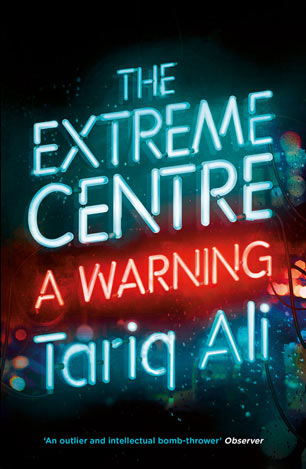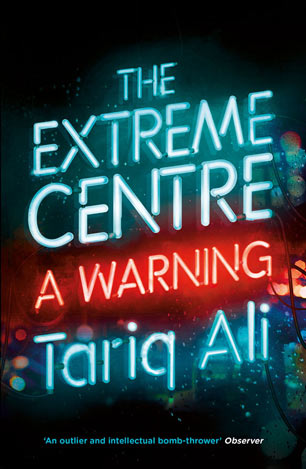 (Image: Verso Books)The following is an excerpt from the introduction to The Extreme Centre: A Warning:
(Image: Verso Books)The following is an excerpt from the introduction to The Extreme Centre: A Warning:
Democracy is in serious trouble, especially in its European heartlands. In the United States the citizens have, more or less, accepted a broken system for over a century. A sizeable percentage of the electorate has accustomed itself to not voting, a form of passive protest and a recognition that the system is pretty much corrupt. They must be smiling at Old Europe now as it slides down the same path, with this exception: whereas US politics is petrified, in a number of European countries challenges to the existing structures are emerging….
These were the economic pillars of the dictatorship of Capital. The upshot was obvious. Politics in the old heartlands of capitalism would become little more than concentrated economics. The state that facilitated and presided over all these changes would function as the executive committee of financialized capitalism, strengthening its defences and, when necessary, intervening to save it from total collapse, as in 2008–2009.
The structurally adjusted system required a novel type of politician in the wake of those pioneers of the new order, Ronald Reagan and Margaret Thatcher. The first was a second-rate actor, operating like a brainwashed zombie and way out of his depth in the White House. Even so he learned his lines well and was lauded as a great communicator, till he began to forget which Latin American capital he had landed in and to fluff the script at home as well.
In reality, the US under Reagan was run by a cabal of right-wing zealots, an imperial politburo that took most of the key decisions of that important period. They transmitted to the world through their president, whose standing reached its height when the last Soviet leader, Mikhail Gorbachev, decided to follow Washington rather than Beijing. Reagan’s successor was his vice-president, George H. Bush (on secondment from the CIA). He only served a single term before being defeated by the Democrat Bill Clinton. But the legacy was safe in New Democrat hands: Clinton proved a zealous and effective defender of the Reagan revolution and much else besides.
Margaret Thatcher surrounded herself with a clique of hard-right advisers to push through the new consensus, but it was not as easy as later painted. For a start there was resistance inside the Conservative Party itself, peaking with Sir Ian Gilmour’s public defiance. His book Dancing with Dogma was a strong defence of the postwar order. Gilmour denounced means testing in particular, with a vigour strikingly absent in later years after New Labour imposed a makeover of the opposition, transforming veteran social democrats and socialists into the living dead: John Prescott, Robin Cook, Jack Straw, David Blunkett, Alan Milburn, Stephen Byers, Harriet Harman come immediately to mind.
Domestically, Thatcher was aided by a number of factors, including an unrepresentative electoral system whereby she never had to win a plurality of the votes, and an internally divided Labour Party that soon split into two. Most importantly, she was strengthened by her decision to provoke and defeat a strike by the toughest section of the British working class. Her triumph against the ‘enemy within’ and how it was organized has been well documented.
Externally, the war to retake the Malvinas (Falkland Islands) ended in victory thanks to the support of the Labour leader Michael Foot at home and of General Pinochet in Chile. Foot had denounced the US-backed Argentinian dictator, General Galtieri, as a Hitler (the first of many such analogies to be used in the years ahead). The defeat of the Argentinian Hitler required the help of the Chilean Hitler. The two triumphs were decisive in the canonization of Thatcher at home and in Europe. Subsequently, the ‘Iron Lady’ sobriquet (invented by her sycophants) became firmly attached to her name. In Eastern Europe she is still regarded by the elites as the ‘Mother of the Peoples.’
However, it was her own party colleagues, worried by her increasing isolation from reality and fearing electoral defeat, who brought her down. This was a shame, perhaps; it would have been far better had she been defeated at the polls. A year before she was first elected, Lord Hailsham, fearing that a left-wing Labour Party backed by militant unions was about to be returned instead, delivered a prescient address on the constitution which warned: ‘There has always been a danger inherent in our constitution that elective dictatorship would take over.’
In the event, the danger (and not just in Britain) came neither from left nor right, but from all the mainstream parliamentary parties acting in unison to defend capitalism: the extreme centre. It is an outcome of the fact that the very nature of the economic system in force precludes democratization. The contradiction between the dense concentration of capital and the needs of a majority of the population is becoming explosive. But the hollowing out of democracy is not a process that can be reversed by parliamentary decree alone. It requires mass mobilizations, popular assemblies, to create new movements and parties. They, in their turn, will need new constitutions that buttress radical democracy. This process that began in America is now filtering through to Europe: Podemos in Spain, Syriza in Greece, the radical Independence Campaign in Scotland – all these are pioneering a new form of politics to challenge and, hopefully, defeat the extreme centre.
All footnotes for the Introduction can be found in the full edition of The Extreme Centre: A Warning.
Copyright (2015) by Tariq Ali. Not to be reprinted without permission of the publisher, Verso Books.
Join us in defending the truth before it’s too late
The future of independent journalism is uncertain, and the consequences of losing it are too grave to ignore. To ensure Truthout remains safe, strong, and free, we need to raise $34,000 in the next 72 hours. Every dollar raised goes directly toward the costs of producing news you can trust.
Please give what you can — because by supporting us with a tax-deductible donation, you’re not just preserving a source of news, you’re helping to safeguard what’s left of our democracy.
